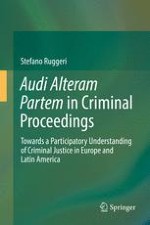2017 | OriginalPaper | Buchkapitel
13. Defence Rights and Participatory Guarantees Acknowledged by EU Law in the International Cooperation Within the Area of Freedom, Security and Justice
verfasst von : Stefano Ruggeri
Erschienen in: Audi Alteram Partem in Criminal Proceedings
Aktivieren Sie unsere intelligente Suche, um passende Fachinhalte oder Patente zu finden.
Wählen Sie Textabschnitte aus um mit Künstlicher Intelligenz passenden Patente zu finden. powered by
Markieren Sie Textabschnitte, um KI-gestützt weitere passende Inhalte zu finden. powered by
